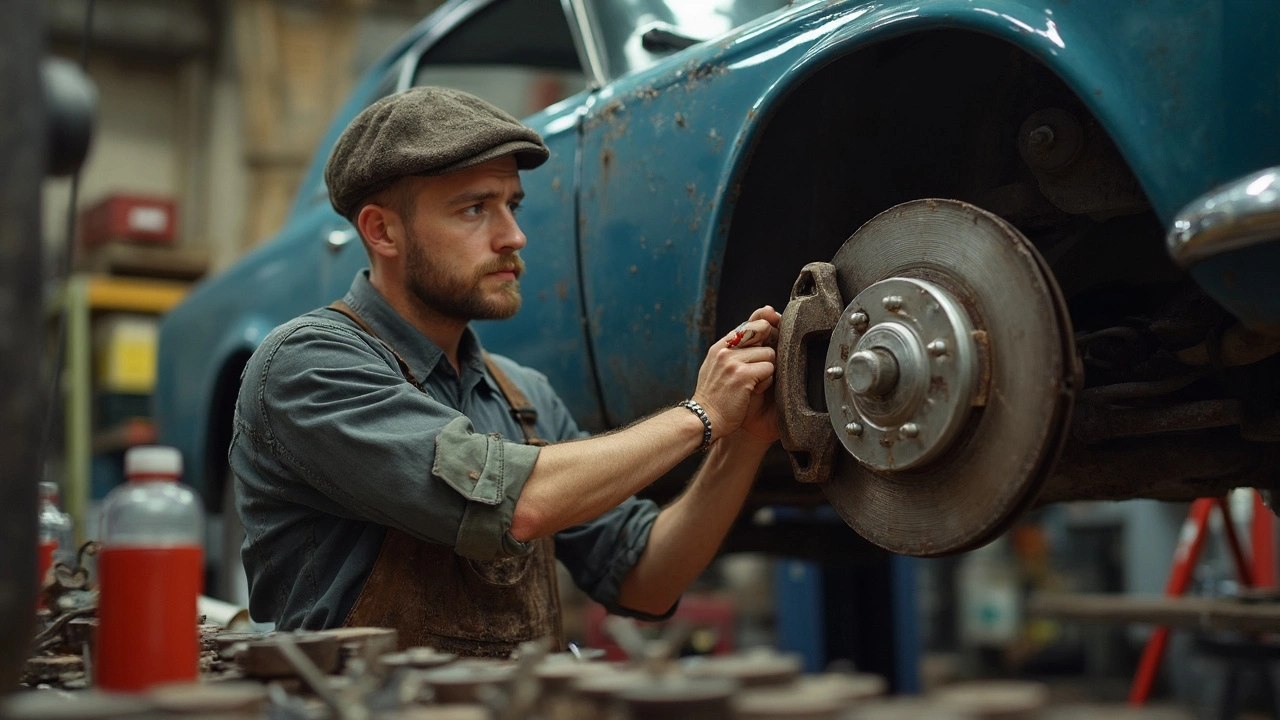We all know brake pads are super important, right? They're the heroes stopping your car safely, yet they often get ignored until it's too late. So, how often should you actually replace them?
The lifespan of brake pads can vary quite a bit. On average, they last about 30,000 to 70,000 miles, which sounds like a huge range, doesn’t it? That's because it really depends on your driving habits and the conditions you drive in. For instance, city drivers usually find themselves replacing brake pads more often than those who stick to the country roads because of all the stop-and-go traffic.
But it's not just about miles. Think about your braking style. Are you the kind of driver who slams on the brakes at the last second? That can wear them out faster. Or maybe you live in a hilly area where you're constantly braking on downhills—that takes a toll, too.
- Understanding Brake Pad Wear
- Factors Influencing Brake Pad Lifespan
- Signs You Need New Brake Pads
- Tips for Extending Brake Pad Life
Understanding Brake Pad Wear
Alright, so let's get into what really causes brake pads to wear down. Imagine your brake pads as slices of bread. Every time you stop your car, you're taking a bite! But unlike bread, they don’t regenerate overnight.
Brake pads work by creating friction against the rotors to slow down your car. Over time, this friction takes its toll. The more you use them, the more they wear down, and if you're a heavy braker, you'll notice this even faster.
How Brake Pads Work
Here's the basic science of it: each time you press the brake pedal, hydraulic fluid transfers force to the brake pads, pushing them against the rotors. This friction is what stops the car, but it also generates a lot of heat and eventually wears down the pad material.
Types of Brake Pads
Not all brake pads are the same. There's a few different types to consider:
- Ceramic Brake Pads: Known for being quieter and cleaner, but they're typically more expensive than others.
- Metallic Brake Pads: These are more durable and offer better performance but can be noisier and wear down the rotors faster.
- Organic Brake Pads: Made from materials like rubber or resin, they’re quieter but may not last as long, especially if you’re a frequent driver.
Interestingly, a study found that rotors and brake pads account for nearly 20% of non-exhaust emissions in urban areas. So, keeping them in check isn't just good for your car—it's good for the planet too!
Understanding the wear and tear on your brake pads isn't just about replacing them on time—it's about knowing how you drive and what works best for your car. Keep an eye out for noises, vibrations, or if the car starts taking longer to stop. These could be signs you need a check-up!
Factors Influencing Brake Pad Lifespan
Brake pad lifespan isn't one-size-fits-all. There are several factors that can tip the balance, either wearing them down quicker or helping them last longer.
Driving Habits
Your driving style has a big say in how long your brake pads last. If you're always on the brakes, like a lead foot in rush-hour traffic, you'll wear them out faster. On the flip side, coasting to a stop when safe, instead of accelerating and braking hard, can extend their life.
Type of Brake Pads
Not all brake pads are created equal. There are semi-metallic, ceramic, and organic pads, each with its own durability profile. Semi-metallic ones are tough but can be rough on rotors. Ceramic pads are quieter and cleaner but might not last as long under extreme conditions. Choosing the right type for your driving needs can impact their longevity.
Environment and Terrain
Where you drive matters. City driving with lots of stop lights wears out brake pads faster than cruising on highways. Similarly, if you're frequently tackling mountain roads, the extra braking on downhills can be taxing.
Vehicle and Load
Think about your car and its load. Heavy vehicles like SUVs and trucks or even sedans frequently packed with gear tend to wear down brake pads more quickly due to the extra weight they need to stop.
Maintenance and Care
Keeping an eye on your brakes and getting regular checks can make a difference. Timely maintenance not only ensures safety but can prevent other issues that could lead to faster brake pad wear. Keeping rotors in shape and maintaining the whole braking system typically enhances pad life.
Here's a quick overview of how these factors play out:
| Factor | Influence on Brake Pad Lifespan |
|---|---|
| Driving Habits | Heavy braking reduces lifespan, coasting extends it |
| Type of Brake Pads | Semi-metallic lasts longer but is harsher, ceramic suited for quieter rides |
| Environment | City and mountainous roads lead to faster wear |
| Vehicle Load | Heavier loads reduce pad lifespan |
| Maintenance | Proper care extends pad life |

Signs You Need New Brake Pads
Keeping an eye (or ear) on your car's brake pads is crucial, as they can give you a heads-up before failing completely. So, what should you be looking out for?
1. Persistent Squeaking or Squealing
If you've started to notice a high-pitched squeal when you brake, don't just turn up the radio and ignore it. This common noise is usually a built-in feature in brake pads used as a wear indicator. It’s like your brakes are gently nudging you to say, “Hey, time for some new pads!”
2. Grinding Sound
Now, if you hear a grinding sound, it might be past time to swap out those pads. Grinding often means the pads are completely worn down, and the metal backing is digging into the rotor—ouch! This is not just bad for your brakes but for your wallet, too, as it can lead to more expensive repairs down the line.
3. Reduced Stopping Power
Finding that it takes longer to stop than it used to? That's a clear sign that your brake pads might be wearing thin. Reduced stopping power can be dangerous, especially in emergency situations, so it's best to address this right away.
4. Indicator Lights
Some modern cars do the heavy lifting for you with a dashboard warning light that pops on when it’s time to check those pads. If you see it, don't ignore it.
5. Visual Inspection
If you're someone who likes to get hands-on, take a quick peek through your car's wheel spokes. You can usually see the brake pads. If they appear less than 1/4 inch thick, it’s time to replace them.
Paying attention to these signs can help you keep your car stopping smoothly and avoid more costly repairs. Remember, regular car maintenance is key to staying safe on the road.
Tips for Extending Brake Pad Life
Want to keep your brake pads in top shape for longer? There are a few simple habits you can change that make a big difference. Let's dive into some practical steps you can take to extend the life of those pads.
Smooth Out Your Driving
First up, curb the urge to hit those brakes hard and often. Instead of racing to a stop, try a gentle, steady brake approach. You not only make your pads last longer, but it also keeps your car's brake system healthier.
Reduce Heavy Loads
Carrying a boatload of stuff in your trunk? Shedding extra weight means your car doesn't have to work as hard to stop. The lighter your vehicle, the less strain on the brake system and pads. Consider removing things you don't need to haul around every day.
Coast When You Can
Here's a neat trick: whenever possible, take your foot off the gas early and let your car coast to slow down before you actually apply the brakes. It gives you smoother stops and saves your brake pads some wear and tear.
Be Mindful of Speed
The faster you drive, the more energy brakes need to release to stop the car. Keeping your speed in check not only makes your brakes last longer, but it's also safer, helping you avoid potential accidents.
Regular Inspections
Last but definitely not least, have your brakes checked regularly. It doesn’t mean you need to replace them every time, but spotting small issues early can help prevent bigger, more expensive problems down the line.
Admittedly, the effort to change long-held driving habits can be tough, but these tips can offer more miles before you'll have to replace those trusty brake pads. Bonus? Your wallet will thank you, too!

